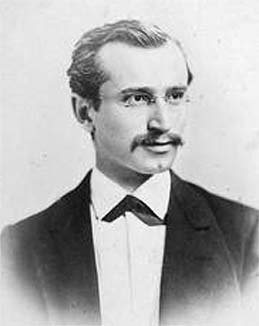

تاريخ الرياضيات

الاعداد و نظريتها

تاريخ التحليل

تار يخ الجبر

الهندسة و التبلوجي


الرياضيات في الحضارات المختلفة

العربية

اليونانية

البابلية

الصينية

المايا

المصرية

الهندية


الرياضيات المتقطعة

المنطق

اسس الرياضيات

فلسفة الرياضيات

مواضيع عامة في المنطق


الجبر

الجبر الخطي

الجبر المجرد

الجبر البولياني

مواضيع عامة في الجبر

الضبابية

نظرية المجموعات

نظرية الزمر

نظرية الحلقات والحقول

نظرية الاعداد

نظرية الفئات

حساب المتجهات

المتتاليات-المتسلسلات

المصفوفات و نظريتها

المثلثات


الهندسة

الهندسة المستوية

الهندسة غير المستوية

مواضيع عامة في الهندسة

التفاضل و التكامل


المعادلات التفاضلية و التكاملية

معادلات تفاضلية

معادلات تكاملية

مواضيع عامة في المعادلات


التحليل

التحليل العددي

التحليل العقدي

التحليل الدالي

مواضيع عامة في التحليل

التحليل الحقيقي

التبلوجيا

نظرية الالعاب

الاحتمالات و الاحصاء

نظرية التحكم

بحوث العمليات

نظرية الكم

الشفرات

الرياضيات التطبيقية

نظريات ومبرهنات


علماء الرياضيات

500AD

500-1499

1000to1499

1500to1599

1600to1649

1650to1699

1700to1749

1750to1779

1780to1799

1800to1819

1820to1829

1830to1839

1840to1849

1850to1859

1860to1864

1865to1869

1870to1874

1875to1879

1880to1884

1885to1889

1890to1894

1895to1899

1900to1904

1905to1909

1910to1914

1915to1919

1920to1924

1925to1929

1930to1939

1940to the present

علماء الرياضيات

الرياضيات في العلوم الاخرى

بحوث و اطاريح جامعية

هل تعلم

طرائق التدريس

الرياضيات العامة

نظرية البيان
Alexander Wilhelm von Brill
المؤلف:
J B Pogrebyssky
المصدر:
Biography in Dictionary of Scientific Biography
الجزء والصفحة:
...
17-1-2017
579
Died: 8 June 1935 in Tübingen, Germany

Alexander von Brill was a nephew of Christian Wiener who has a biography in this archive.
Brill studied at the Technische Hochschule in Karlsruhe where he was taught by Clebsch who had taught in Karlsruhe since 1858. In 1863 Clebsch moved from Karlsruhe to the University of Giessen and Brill also moved to Giessen. Again taught by Clebsch, Brill graduated from Giessen in 1864. Remaining in Giessen after his graduation to undertake research, Brill submitted his habilitation thesis in 1867. After the thesis was accepted Brill was appointed a privatdozent in Giessen, a post he held for two years.
In 1869 Brill left Giessen to take up an appointment as professor of mathematics at the Technische Hochschule in Munich. There he was joined by Klein in 1875 and the two taught advanced courses to large numbers of excellent students. Brill and Klein both had a great interest in teaching and Brill, like Klein, participated in the movement to reform the teaching of mathematics. In particular Brill [1]:-
... was an initiator of the use of models of geometric figures in teaching; many such models were prepared under his guidance.
It is clear that Brill was much influenced by being a colleague of Klein's for five years and the influence would show up in many different ways throughout Brill's career. Brill taught a remarkably talented collection of students while at the Technische Hochschule in Munich including, for example Hurwitz, von Dyck, Rohn, Runge, Planck, Bianchi and Ricci-Curbastro. Although Klein left Munich in 1880, Brill was to remain there for a few more years, taking up the chair of mathematics in the University of Tübingen in 1884. Brill held this chair until he retired in 1918 at the age of 76, but continued to live and do mathematics in Tübingen after his retirement until his death at age 92.
He contributed to the study of algebraic geometry, trying to bring the rigour of algebra into the study of curves. In 1874 he published a joint work with Max Noether on properties of algebraic functions which are invariant under birational transformations. His work allowed the notion of genus of a curve, introduced by Clebsch, to be extended to singular and non-singular curves. In 1894 he wrote, again in collaboration with Max Noether, an extremely important survey of the development of the theory of algebraic functions. Pogrebyssky, in [1], also notes the importance of:-
... his papers on three-dimensional algebraic curves (1907) and on pseudospherical three-dimensional space (1885), where the impossibility of putting such a space into Euclidean four-dimensional space and the possibility of its being placed in a Euclidean five-dimensional space are proved.
Brill also wrote on determinants, elliptic functions, special curves and surfaces. He wrote articles on the methodology of mathematics and on theoretical mechanics. At age 87 he wrote a book on Kepler's astronomy
- J B Pogrebyssky, Biography in Dictionary of Scientific Biography (New York 1970-1990).
http://www.encyclopedia.com/doc/1G2-2830900630.html
Articles:
- G Betsch, Alexander von Brill (1842-1935), Bausteine zur Tübinger Universitätsgeschichte (1987), 71-90.
- S Finsterwalder, Alexander von Brill. Ein Lebensbild, Mathematische Annalen 112 (1936), 653-663.
- E Löffler, Alexander von Brill. Zur 100. Wiederkehr seines Geburtstages, Jber. Deutsch. Math. Verein. 53 (1943), 82-89.
 الاكثر قراءة في 1840to1849
الاكثر قراءة في 1840to1849
 اخر الاخبار
اخر الاخبار
اخبار العتبة العباسية المقدسة

الآخبار الصحية















 قسم الشؤون الفكرية يصدر كتاباً يوثق تاريخ السدانة في العتبة العباسية المقدسة
قسم الشؤون الفكرية يصدر كتاباً يوثق تاريخ السدانة في العتبة العباسية المقدسة "المهمة".. إصدار قصصي يوثّق القصص الفائزة في مسابقة فتوى الدفاع المقدسة للقصة القصيرة
"المهمة".. إصدار قصصي يوثّق القصص الفائزة في مسابقة فتوى الدفاع المقدسة للقصة القصيرة (نوافذ).. إصدار أدبي يوثق القصص الفائزة في مسابقة الإمام العسكري (عليه السلام)
(نوافذ).. إصدار أدبي يوثق القصص الفائزة في مسابقة الإمام العسكري (عليه السلام)


















